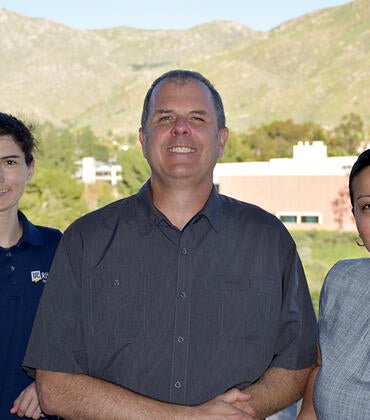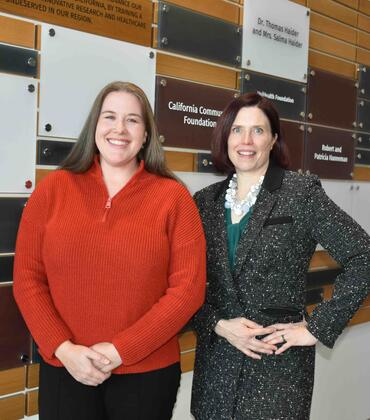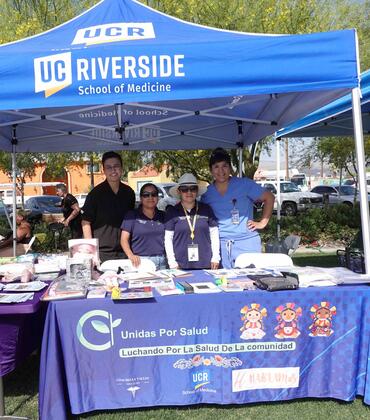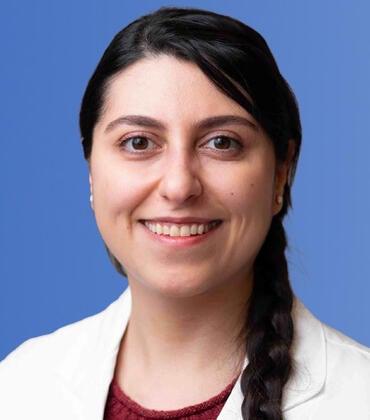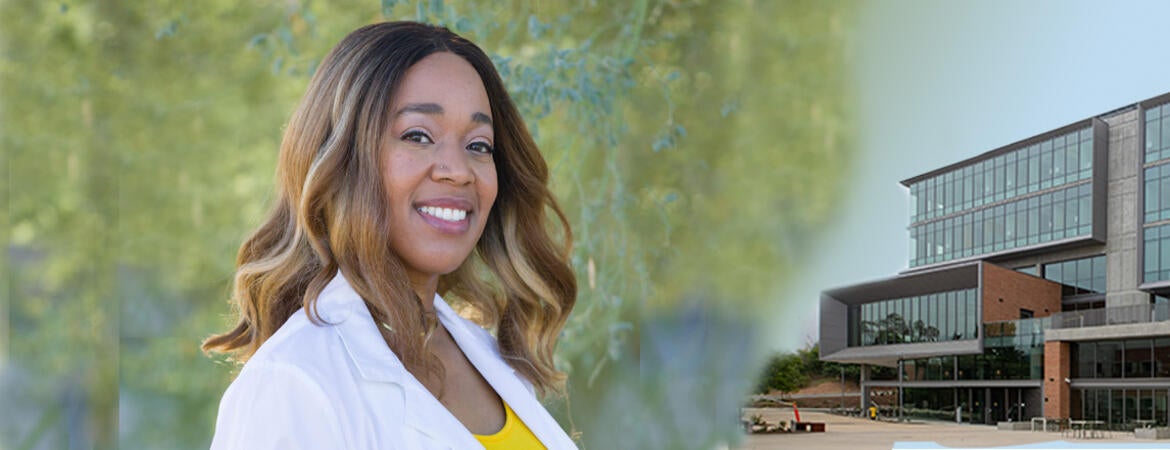
As a child in Botswana, Esther Caroline McGowan, MD, still remembers the love that her mother, a nurse, had for her patients. “That was one of the reasons that I wanted to get into medicine,” recalled McGowan, who is now a pediatrician at UCR Health. “In my mind, everyone deserved to have care from someone like my mom who would treat each patient as if they were part of the family.”
At age 17, McGowan moved to the United States and after completing her undergraduate degrees, attended Morehouse School of Medicine in Atlanta. Throughout her medical education, including her residency at the Jacobi Medical Center at the Albert Einstein College of Medicine in the Bronx, she found herself alarmed by the disparities in healthcare present even in the resource-rich U.S. “I didn't understand why some people who looked differently or didn't speak a particular language couldn't have the same access to care, even though that should be a basic human right,” McGowan said.
Her experiences drove her to focus on serving the underserved, a mission shared by the UCR School of Medicine and its clinical enterprise, UCR Health. After completing her fellowship in Academic General Pediatrics and receiving her Masters of Science in Clinical Research Methods at the Children's Hospital at Montefiore, Albert Einstein College of Medicine in New York, McGowan decided to join UCR’s pediatrics department in August 2022, calling it a “small but mighty department.”
“The mission of the school is to provide excellent care to patients but also focus on the community and reaching the underserved, which has always been a passion of mine from medical school,” she explained.
Preparing kids for healthy lives
McGowan builds on her goals to provide care to underserved populations by working with patients, conducting research, and serving as co-director of the Longitudinal Ambulatory Care Experience (LACE) at the UCR SOM.
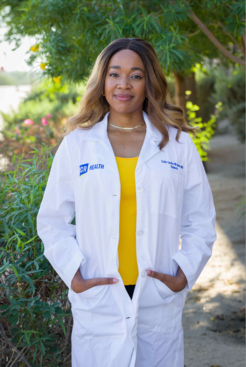
As a pediatrician, McGowan takes the same approach to patient care that her mother did as a nurse. “I want to make sure that I provide my patients with evidence-based, excellent medical care,” she said. “If I do not have all the answers, I’ll collaborate with colleagues and sub-specialists to make sure that my patients are cared for in the same way that I would want my own family member cared for.”
She loves working with children in particular because of her ability to positively affect their health--and lives--for years to come. “You’re checking for their developmental milestones, that they're progressing developmentally as a one-year-old and a two-year-old, making sure that they go through middle school well, and making sure that they're successful through high school,” McGowan explained. “Whatever it is that they want to do in the long run, you have the potential to influence that.”
Sometimes, she’s able to support parents in getting their children the help they need. “You’ll have the mother saying, ‘Thank you, I knew something was wrong, but no one was listening to me,’ having those interactions and then making sure that we do our best to get them resources,” she said.
In other cases, it’s up to her to notice the issue and make sure it gets resolved.
With one young patient, McGowan noticed early on that the child wasn’t meeting standard communication milestones. When she shared her concerns with the parents, though, they insisted that things were fine and they would work with their child on their own. McGowan scheduled several follow-up appointments and continued to carefully voice her concerns while recommending home activities to encourage speech development. Eventually, the parents accepted that their child was not reaching the expected milestones and agreed to start speech therapy.
A few months later, McGowan said, the child’s communication had noticeably improved. “That was very encouraging, because it took a very long time to get the parents ready to accept assistance,” she said. “Now the child is going to start school and be almost on par with their classmates and have the potential to succeed just as much as any other child.”
Research to impact all patients
Beyond the patients she works with individually, McGowan aims to help an even broader group with her research on mental health. “Research interested me because of the opportunity to be able to touch more than one person at a time with the discoveries or progress we made,” she explained.
Her fellowship research project examined the effect of resilience factors on reducing the impact of adverse childhood experiences (ACES) to promote mental health in adolescents. McGowan plans to continue this research by screening patients for ACES, and eventually developing a toolkit to promote resilience factors among young people.
Alongside this work, McGowan takes the time to present public talks about mental health. “The idea is raising awareness and hoping to destigmatize mental health in the community,” she said. McGowan is also becoming more involved in clinical trials to help increase access for underserved and underrepresented patients. “If we don't know how certain treatments work in people with different environmental exposures and demographics, how can we say that one treatment plan will work similarly for everyone?” she said. “I want to make sure I'm advancing research that's going to benefit patients long after I'm practicing.”
Building the future of medicine with LACE
McGowan’s third main role, as co-director of LACE since May 2023, also benefits future patients by helping medical students understand essential aspects of working with underserved populations, like social determinants of health and potential cultural and cognitive biases. The unique SOM program pairs students with clinicians in the community, allowing them to work directly with patients from their first year of medical school.
In addition to her co-director position, McGowan leads the clinical reasoning thread in LACE, which teaches methods for determining a patient's diagnosis and treatment plan that often aren’t taught in medical school. "This way, UCR students have the tools to excel as they graduate into residency and work with other matriculating students who may have had other advantages," McGowan said.
Moazzum Bajwa, MD, MPH, LACE co-director and an assistant clinical professor of health sciences, recalled observing McGowan's first clinical reasoning teaching session. "It was clear from the start that Dr. McGowan is a natural and excellent teacher," he said. "She uses examples from her own clinical practice and provides entertaining active learning strategies to guide the students to start 'thinking like a physician' from the first month of medical school. I left the classroom wishing I had a teacher and mentor like Dr. McGowan when I was in medical school."
McGowan’s work in LACE also helps students successfully reach their goal of becoming physicians--another benefit in a community with an insufficient number of doctors. The program directly counters common issues like burnout and medical education systems that often aren’t designed for underrepresented students.
McGowan faced this issue herself after moving to a new country without her family and navigating medical school on her own. “The way that medical school is structured doesn't always take into account different cultural backgrounds, the different ways that people have been raised, and isn't necessarily constructed for their success,” she explained. “I wanted to give back and teach medical students and residents to ensure that they know that they deserve to be in medicine, and to encourage them with different resources,” she added. “Also, seeing someone that might look like them, or different from the stereotypical doctor, might encourage them to go further.”
“Dr. McGowan intimately understands the challenges of under-represented minoritized students in medicine,” said Bajwa. “Dr. McGowan encourages our team to challenge the status quo and offers thoughtful perspectives on how to improve upon existing ideas, programs, and structures through creative collaboration.”
Students have appreciated McGowan’s caring approach. McGowan “truly values students and their voice, and she is genuinely invested in the growth of us students through her work and actions,” said Ingrid Channa, a class of 2027 medical student representative who worked with LACE leadership, including McGowan, to implement student feedback on the program. “Especially with the culture of medicine and the hierarchy within medicine, there can be some fear or hesitancy that persists among medical students to voice our concerns or opinions, but she and [co-director] Dr. Bajwa continue to encourage and value the voice of students.”
“Working alongside Dr. McGowan has been a privilege,” added Patricia Walker, associate director of LACE. “Through her leadership, we have been able to streamline processes, implement innovative teaching methods, and enhance the overall quality of education and clinical experience for our students.”
Students form often lifelong mentorships with their preceptors, but LACE benefits these physicians, too. “As a preceptor, you get to see a student from their first year into their third year, and I have received emails that warmed my heart from preceptors saying how amazing it is to work with the students that we have at UCR School of Medicine,” she said. “Seeing learners grow and progress actually helps remind us, too, how fulfilling it is not just from the patient aspect of it, but also giving back to future physicians.”
Each of McGowan’s roles complements the others, as keeping up with new evidence-based medicine practices with her students benefits her patients, and her experiences with her patients help inform her teaching and her research. McGowan said she’s still learning to find the ideal balance with each of her positions, but they all come back to the same idea. “My heart has always been to make sure that all individuals have access to excellent medical care regardless of their potential sociodemographic characteristics,” she said.
